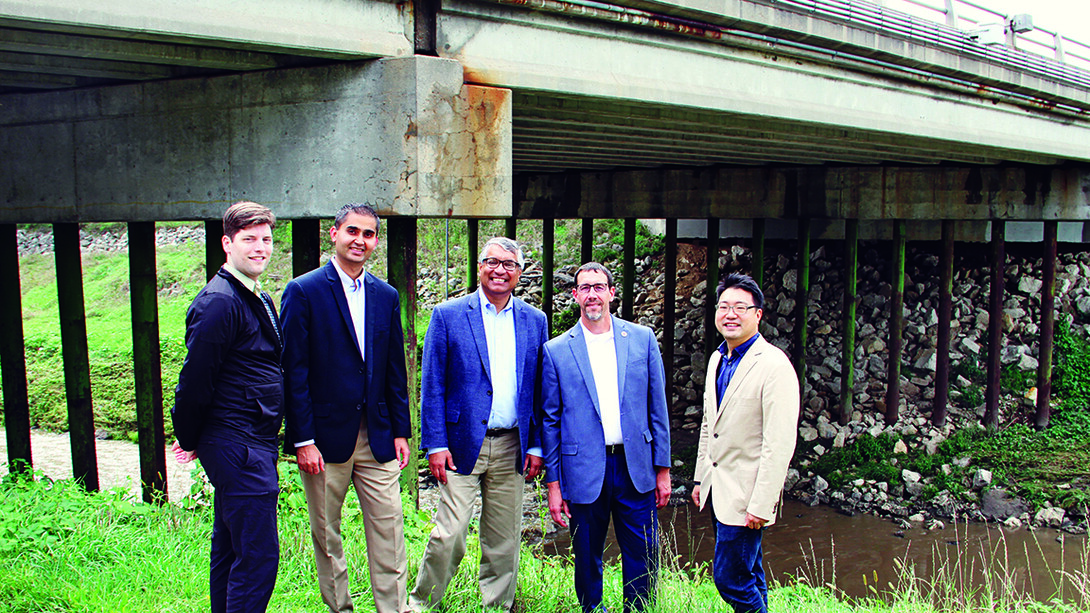
University of Nebraska-Lincoln and University of Nebraska at Omaha researchers have been awarded $5 million by the Department of Defense Army Corps of Engineers for research to extend the lifespan of bridges through new monitoring technology.
Daniel Linzell, professor of civil and environmental engineering and associate dean for graduate and international programs at UNL, and Robin Gandhi, professor of information science and technology and director of the School of Interdisciplinary Informatics at UNO, will conduct the research project, “Multilevel Analytics and Data Sharing for Operations Planning.”
Using rural Nebraska bridges as full-scale “testbeds,” Gandhi, Linzell and other Nebraska U researchers, in collaboration with the Kinnami Software Corp., will conduct research and development relating to data collection at the edge using internet of things including sensors, unmanned aerial vehicles and more; secure data processing and management from the edge to the cloud; visualizations and analytics of data using machine learning; socio-technical impacts such as fairness of data, algorithms, and analysis; and decision support systems.
U.S. Sen. Deb Fischer, ranking member of the Senate Commerce Surface Transportation Subcommittee and a high-ranking member of the Senate Armed Services Committee, was instrumental in advancing the project, which was included in the Senate Defense Appropriations Bill approved in December 2020.
“New monitoring technology has the potential to increase the safety of our nation’s bridges and make infrastructure repairs less costly,” she said. “Through this important research, Nebraska will lead the way in the development of these sensors to help address transportation challenges in the future.”
Interest is on the rise nationally for using electronic information systems to provide data on a bridge’s structural performance between regular in-person inspections. New systems would allow officials to more closely monitor the health and safety of bridges at a time when a recent analysis of U.S. Department of Transportation data shows more than one-third of U.S. bridges are in disrepair. While these systems would provide early detection of potential safety hazards, they could be vulnerable to cybersecurity threats.
The research project will allow for predictions of remaining bridge life and guidance for maintenance using secure communications and protected data systems. It also will provide mission-critical data for use by the Department of Defense as well as public and private stakeholders to better prioritize budgets, protect bridges, and, most importantly, ensure the safety of those who travel on them.
“With the ability to electronically monitor the structural safety and stability of our infrastructure comes the responsibility to protect it from cyber security risks,” Gandhi said. “This research aims to add to a growing body of knowledge in both of these areas.”
Linzell added that while bridges in the U.S. have admirably served the traveling public for decades, they are at a point where advanced age, increased demand, extreme weather, and finite resources necessitate modifications to how their health is assessed and how bridge systems are managed.
“Our team’s findings will augment current processes and allow for optimal allocation of labor and financial resources while, most importantly, maintaining safety,” he said. “New technologies will be robust enough to support management of other large, infrastructure systems and could provide unique economic development opportunities in Nebraska.”
Gandhi credited a large network of people and institutions who contributed to making this research effort possible, which includes Kinnami Software, which will be developing its resilient data platform, AmiShare, to protect and manage the sensitive data related to this project.
“This project would not have happened without the vision and support of several individuals and organizations,” Gandhi said, pointing back to the 2015 decision by the deans of the UNO College of Information Science and Technology and the UNL College of Engineering to identify infrastructure safety as a priority area.
Additional faculty involved in the project are Deepak Khazanchi and Brian Ricks from UNO and Chungwook Sim of UNL , with collective expertise in the socio-technical impact of continuous infrastructure monitoring; machine learning, visualization and simulation; and infrastructure health monitoring with next-generation sensing.
Linzell and Gandhi previously were part of a team that received a $1 million National Science Foundation grant to establish a Big Data Spoke headquartered at UNO, focused on producing a smart big data pipeline for rural bridge health management.







